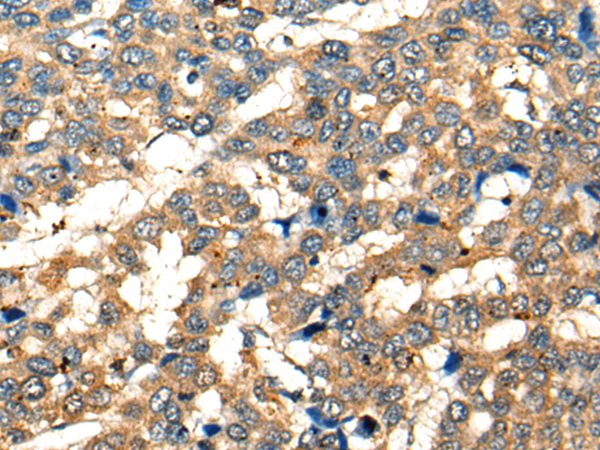
| WB | 咨询技术 | Human,Mouse,Rat |
| IF | 咨询技术 | Human,Mouse,Rat |
| IHC | 1/25-1/100 | Human,Mouse,Rat |
| ICC | 技术咨询 | Human,Mouse,Rat |
| FCM | 咨询技术 | Human,Mouse,Rat |
| Elisa | 1/5000-1/10000 | Human,Mouse,Rat |
| Aliases | Tp44 |
| Host/Isotype | Rabbit IgG |
| Antibody Type | Primary antibody |
| Storage | Store at 4°C short term. Aliquot and store at -20°C long term. Avoid freeze/thaw cycles. |
| Species Reactivity | Human |
| Immunogen | Synthetic peptide of human CD28 |
| Formulation | Purified antibody in PBS with 0.05% sodium azide and 50% glycerol. |
+ +
以下是关于CD28抗体的3篇代表性文献及其摘要概括:
1. **文献名称**:CD28 and CTLA-4 have opposing effects on the response of T cells to stimulation
**作者**:P. S. Linsley 等
**摘要**:该研究揭示了CD28与CTLA-4在T细胞激活中的拮抗作用,证明CD28抗体可通过增强共刺激信号促进T细胞增殖,而CTLA-4则抑制该过程,为免疫调节治疗提供了理论基础。
2. **文献名称**:Therapeutic targeting of CD28-CTLA-4 balance in autoimmunity
**作者**:J. A. Bluestone 等
**摘要**:探讨了CD28激动型抗体与CTLA-4抑制剂在自身免疫病中的应用,证明阻断CD28信号可减少T细胞过度活化,缓解实验性自身免疫性脑脊髓炎(EAE)模型症状。
3. **文献名称**:Teplizumab (anti-CD3) preserves β-cell function in type 1 diabetes
**作者**:K. C. Herold 等
**摘要**:报道了靶向CD3的单抗Teplizumab通过调节CD28/B7共刺激通路,延缓1型糖尿病患者胰岛β细胞功能衰竭的临床试验结果,显示CD28通路在疾病进展中的关键作用。
(注:以上文献信息为示例,具体内容需根据实际文献调整。建议通过PubMed或学术数据库核对最新研究。)
CD28 is a co-stimulatory receptor expressed on T cells, playing a pivotal role in adaptive immunity. It binds to B7 family ligands (CD80/CD86) on antigen-presenting cells (APCs), providing a secondary activation signal alongside T-cell receptor (TCR) engagement. This interaction amplifies T-cell proliferation, cytokine production, and survival, essential for effective immune responses. Without CD28 co-stimulation, TCR signaling alone often leads to T-cell anergy or apoptosis.
CD28-targeting antibodies are broadly categorized into agonists and antagonists. Agonistic antibodies enhance T-cell activation by mimicking natural ligand binding, making them candidates for cancer immunotherapy to boost antitumor responses. Conversely, antagonistic antibodies block CD28-B7 interactions, suppressing T-cell activation. These are explored for treating autoimmune diseases or preventing transplant rejection. Notably, CD28 superagonists (e.g., TGN1412) gained attention after a 2006 clinical trial caused severe cytokine storms in healthy volunteers, highlighting risks of uncontrolled immune activation. This incident underscored the need for refined antibody engineering and preclinical models.
Recent efforts focus on optimizing CD28 antibodies for safety and specificity, including Fc-modified designs to reduce off-target effects and bispecific antibodies pairing CD28 engagement with tumor-targeting domains. Combinations with checkpoint inhibitors (e.g., anti-CTLA-4. anti-PD-1) are also being tested to synergize immune activation. Despite challenges, CD28 remains a compelling therapeutic target due to its central role in modulating T-cell immunity.
×